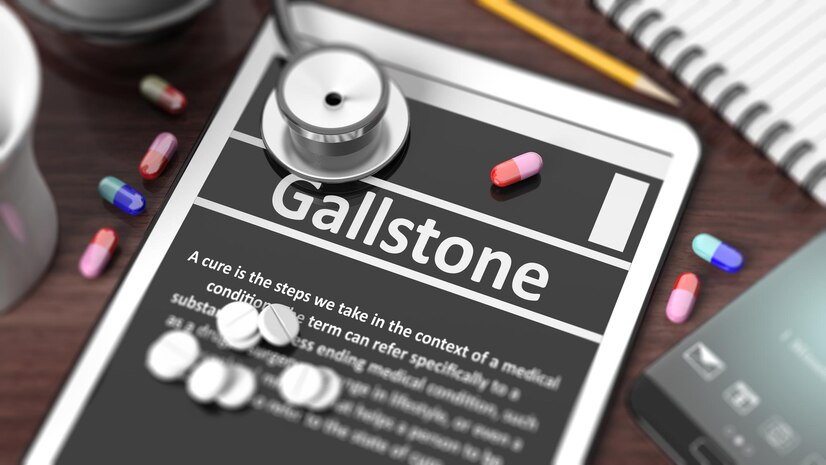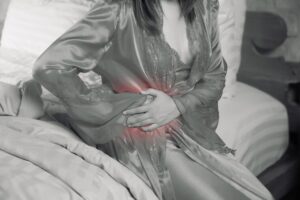Gallstone disease is the commonest pathology of the gallbladder which is caused by deposits of digestive fluid inside the gallbladder including cholesterol and bile acids. Gallbladder is an organ situated in the right side of your abdomen, below the liver which holds digestive fluid called bile.

Types of Gallstones
- Cholesterol stones – This type is more common in the USA and Europe, which are made of cholesterol
- Pigment stones – This type is more common among Asians and these stones can be found in black color or brown color. These are made of insoluble contents of bile and calcium salts.
- Mixed stones – They are made of a mixture of cholesterol, calcium salts, bile acids, bile pigments, and phospholipids.
Etiology of Gallstone
- Increased cholesterol concentration in bile acids can be due to age, sex, genetics, obesity, or diets with high amounts of choke.
- Impaired functioning of the gallbladder causes reduced excretion and emptying of bile into the small intestine and stasis of bile inside the gallbladder.
- Increased concentration of bilirubin in bile which occurs due to increased disruption of red blood cells due to blood disorders.
- Due to some abdominal surgeries such as ileocecal resection
- Some infections can also increase the formation of stones from cholesterol.
Risk Factors

- Females
- Fertile age period
- Sedentary lifestyle
- Obesity
- Being the age of 40 or above
- High-fat, high-cholesterol, and low-fiber diets
- Native Americans and white people
- Blood disorders that disrupt red blood cells
- Family history of a relative having gallstones
- Some drugs as oral contraceptives pills
- Having diabetes
- Having liver disease
Clinical Features
- Most of the time they are asymptomatic
- Severe abdominal pain in the right upper abdominal region which may last for minutes or several hours
- Pain can occur in the center of the abdomen just below the breastbone
- Pain can radiate to the back and shoulder blades
- Flatulence
- Food intolerances especially fatty food
- Nausea and vomiting
Complications of Gallstone
- Inflammation of the gallbladder
- Accumulation of pus inside the gallbladder names as Empyema
- Perforation of gallbladder
- Obstruction of bile ducts causing impairment of bile secretions to the intestine
- Intestinal obstruction also can occur rarely
- Inflammation of pancreas
- Inflammation of the biliary tract
Diagnosis
Mainly gallstones are diagnosed by history and physical examination of with confirmatory radiological studies such as transabdominal ultrasonography.
Management of Gallstone
The treatment of gallstones may include lifestyle changes, medication, or surgery.
Pharmacological Management
If you are not suitable to undergo surgery you will be given medications that dissolve gallstones such as Chenodiol and Ursodiol. You will have to take drugs for a long period and the disadvantage is that there is a risk for stones to recur once you stop drugs.
Surgical Management of Gallstone
Removal of the gallbladder is done in two ways; laparoscopically or as open surgery. Even after the removal of the gallbladder you can digest food in the normal way.
Life Style Modification
- Don’t skip meals, stick to the usual meal time and avoid fasting
- Do not lose weight rapidly
- Eat a higher fiber, less fat diet including fruits, vegetables, and whole grain
- Maintain a healthy weight and engage in regular exercise
- If you are a woman with a high risk for developing gallstones you will have to avoid oral contraceptive pills and use another method of contraception.
References
- Bailey and Love’s Short Practice of Surgery- 27th Edition
- Kumar and Clerk’s Clinical Medicine -8th Edition- Parveen Kumar, Michael Clark
- Oxford Handbook of Clinical Medicine – 10th Edition
- Browse’s Introduction to the Symptoms and Signs of Surgical Disease – 4th Edition – Norman L. Browse, John Black, Kevin G. Burnand and William E.G. Thomas


One thought on “All You Need to Know About Gallstone Disease”
Comments are closed.